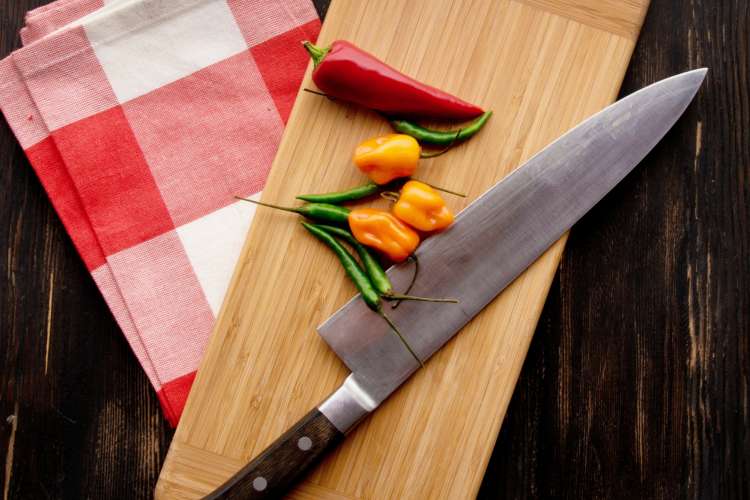In the world of culinary arts, the tools you use can determine the quality of your work. For kitchen professionals, finding the best German knife for meat is a priority. Known for their precision, durability, and craftsmanship, German knives have been a staple in kitchens around the world. Whether you're slicing, dicing, or carving, the right knife makes all the difference.
When it comes to cutting meat, the choice of knife is crucial. The best German knife for meat is not just about sharpness, but also about balance, weight, and ergonomic design. These factors contribute to the ease of use and efficiency in the kitchen. In this article, we will explore the top contenders for the title of the best German knife for meat and what makes them stand out.

Why Choose a German Knife for Meat?
Unparalleled Craftsmanship
German knives are renowned for their exceptional craftsmanship. Brands such as Wsthof and Zwilling J.A. Henckels have been producing high-quality knives for centuries. The meticulous attention to detail and use of high-carbon stainless steel ensure that these knives remain sharp and resilient, even under heavy use. This makes them ideal for cutting through tough cuts of meat with precision.
Durability and Longevity
One of the standout features of German knives is their durability. Thanks to the robust construction and use of premium materials, these knives can withstand the rigors of professional kitchen environments. The full tang design, where the blade extends through the handle, provides added strength and stability. This means that a well-maintained German knife can last a lifetime.
For those interested in maintaining their knives, the German Knife Maintenance Guide offers invaluable tips on keeping your tools in top condition.
Precision and Performance
When it comes to cutting meat, precision is key. German knives are known for their sharp edges and excellent edge retention. This allows chefs to make clean cuts without tearing or shredding the meat. The heavier weight of German knives also aids in cutting through dense meat with ease, making them a favored choice among professionals.
Top German Knives for Meat Cutting
Wsthof Classic 8-Inch Chef's Knife
The Wsthof Classic 8-Inch Chef's Knife is a favorite among chefs for its versatility and performance. The knife features a razor-sharp edge that is perfect for slicing through meat with precision. Its ergonomic handle ensures a comfortable grip, reducing fatigue during extended use. This knife is also well-balanced, allowing for easy maneuvering and control.
Zwilling J.A. Henckels Professional S Chef's Knife
Another top contender is the Zwilling J.A. Henckels Professional S Chef's Knife. This knife is forged from high-carbon stainless steel, making it highly durable and resistant to staining. The precision-honed blade ensures long-lasting sharpness, while the triple-riveted handle provides a secure grip. This knife is ideal for both professional chefs and home cooking enthusiasts.
For a deeper understanding of the differences between German and other types of knives, you can explore the article on German vs. French Knives.
Victorinox Fibrox Pro Chef's Knife
Though not traditionally German, the Victorinox Fibrox Pro Chef's Knife is often compared to the best German knives due to its high quality and performance. It offers excellent value for money, with a non-slip handle and a blade that retains its sharpness for extended periods. This knife is perfect for those seeking a reliable tool without breaking the bank.
Maintaining Your German Knife
Proper maintenance is essential to ensure the longevity and performance of your German knife. Regular honing and sharpening will keep the blade in optimal condition. It's also important to store your knife properly, either in a knife block or on a magnetic strip, to prevent damage.
For more tips on knife maintenance, check out this comprehensive knife care guide.

FAQs about German Knives for Meat
What makes German knives different from Japanese knives?
German knives are typically heavier and have a thicker blade, making them ideal for cutting through tough meat. Japanese knives, on the other hand, are lighter and have a sharper edge, which is excellent for precision tasks.
How often should I sharpen my German knife?
It depends on usage, but generally, it's recommended to hone your knife regularly and sharpen it every few months to maintain its edge.
Can I use a honing steel on a German knife?
Yes, using a honing steel is a great way to keep your German knife's edge aligned and sharp.
In conclusion, choosing the best German knife for meat involves considering factors like craftsmanship, durability, and precision. Whether you're a professional chef or a cooking enthusiast, investing in a high-quality German knife can elevate your culinary skills.
For more information on how chef's knives are made, you might find this article on How a Chef's Knife is Made insightful.


























